Liability of Intoxication in Criminal Proceedings
VerifiedAdded on 2020/10/05
|9
|2759
|479
AI Summary
The provided document is a solved assignment that delves into the topic of liability and intoxication in criminal proceedings. It discusses the significance of intoxication in Australian legislation, the effects of alcohol and other drugs on criminal law, and the evaluation of predominant causes of insanity in cases of drug-induced psychoses. The document cites relevant studies and research papers to support its arguments, providing a comprehensive understanding of the complex variable of intoxication in criminal courts.
Contribute Materials
Your contribution can guide someone’s learning journey. Share your
documents today.
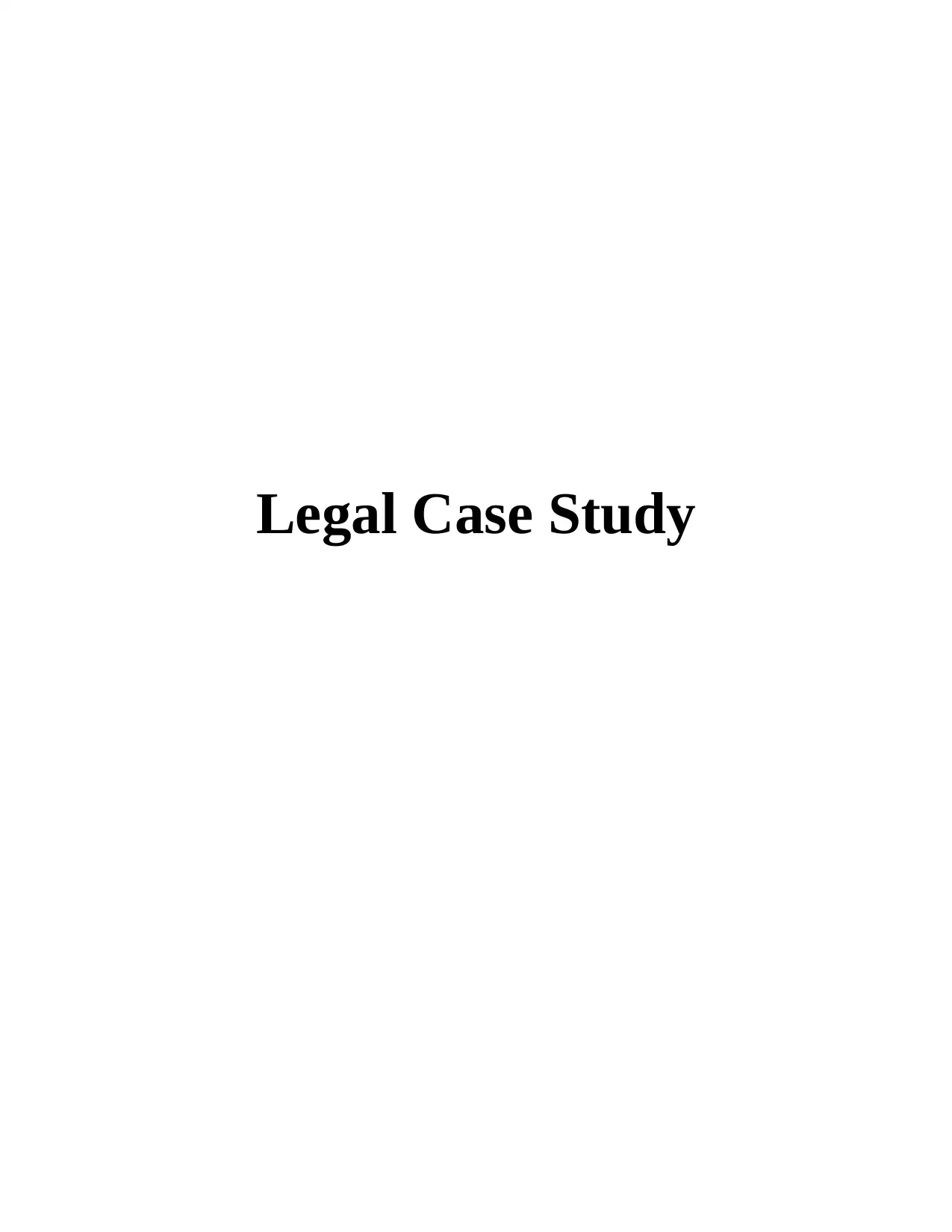
Legal Case Study
Secure Best Marks with AI Grader
Need help grading? Try our AI Grader for instant feedback on your assignments.

TABLE OF CONTENTS
Case 1 - Liability of Quentin for the death of Elliot...................................................................4
Case 2 - Liability of Margo for the death of Julia.......................................................................6
REFERENCES................................................................................................................................9
1
Case 1 - Liability of Quentin for the death of Elliot...................................................................4
Case 2 - Liability of Margo for the death of Julia.......................................................................6
REFERENCES................................................................................................................................9
1
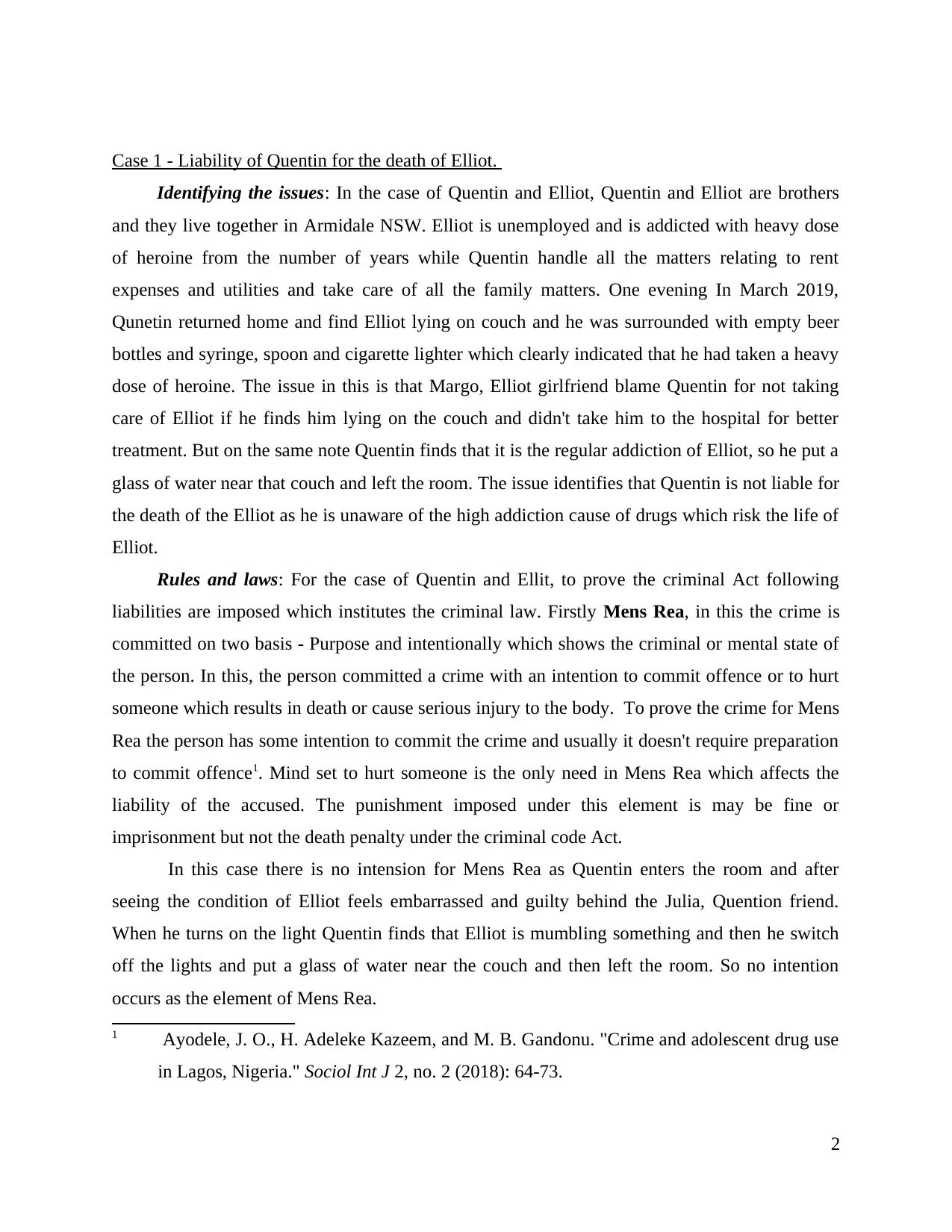
Case 1 - Liability of Quentin for the death of Elliot.
Identifying the issues: In the case of Quentin and Elliot, Quentin and Elliot are brothers
and they live together in Armidale NSW. Elliot is unemployed and is addicted with heavy dose
of heroine from the number of years while Quentin handle all the matters relating to rent
expenses and utilities and take care of all the family matters. One evening In March 2019,
Qunetin returned home and find Elliot lying on couch and he was surrounded with empty beer
bottles and syringe, spoon and cigarette lighter which clearly indicated that he had taken a heavy
dose of heroine. The issue in this is that Margo, Elliot girlfriend blame Quentin for not taking
care of Elliot if he finds him lying on the couch and didn't take him to the hospital for better
treatment. But on the same note Quentin finds that it is the regular addiction of Elliot, so he put a
glass of water near that couch and left the room. The issue identifies that Quentin is not liable for
the death of the Elliot as he is unaware of the high addiction cause of drugs which risk the life of
Elliot.
Rules and laws: For the case of Quentin and Ellit, to prove the criminal Act following
liabilities are imposed which institutes the criminal law. Firstly Mens Rea, in this the crime is
committed on two basis - Purpose and intentionally which shows the criminal or mental state of
the person. In this, the person committed a crime with an intention to commit offence or to hurt
someone which results in death or cause serious injury to the body. To prove the crime for Mens
Rea the person has some intention to commit the crime and usually it doesn't require preparation
to commit offence1. Mind set to hurt someone is the only need in Mens Rea which affects the
liability of the accused. The punishment imposed under this element is may be fine or
imprisonment but not the death penalty under the criminal code Act.
In this case there is no intension for Mens Rea as Quentin enters the room and after
seeing the condition of Elliot feels embarrassed and guilty behind the Julia, Quention friend.
When he turns on the light Quentin finds that Elliot is mumbling something and then he switch
off the lights and put a glass of water near the couch and then left the room. So no intention
occurs as the element of Mens Rea.
1 Ayodele, J. O., H. Adeleke Kazeem, and M. B. Gandonu. "Crime and adolescent drug use
in Lagos, Nigeria." Sociol Int J 2, no. 2 (2018): 64-73.
2
Identifying the issues: In the case of Quentin and Elliot, Quentin and Elliot are brothers
and they live together in Armidale NSW. Elliot is unemployed and is addicted with heavy dose
of heroine from the number of years while Quentin handle all the matters relating to rent
expenses and utilities and take care of all the family matters. One evening In March 2019,
Qunetin returned home and find Elliot lying on couch and he was surrounded with empty beer
bottles and syringe, spoon and cigarette lighter which clearly indicated that he had taken a heavy
dose of heroine. The issue in this is that Margo, Elliot girlfriend blame Quentin for not taking
care of Elliot if he finds him lying on the couch and didn't take him to the hospital for better
treatment. But on the same note Quentin finds that it is the regular addiction of Elliot, so he put a
glass of water near that couch and left the room. The issue identifies that Quentin is not liable for
the death of the Elliot as he is unaware of the high addiction cause of drugs which risk the life of
Elliot.
Rules and laws: For the case of Quentin and Ellit, to prove the criminal Act following
liabilities are imposed which institutes the criminal law. Firstly Mens Rea, in this the crime is
committed on two basis - Purpose and intentionally which shows the criminal or mental state of
the person. In this, the person committed a crime with an intention to commit offence or to hurt
someone which results in death or cause serious injury to the body. To prove the crime for Mens
Rea the person has some intention to commit the crime and usually it doesn't require preparation
to commit offence1. Mind set to hurt someone is the only need in Mens Rea which affects the
liability of the accused. The punishment imposed under this element is may be fine or
imprisonment but not the death penalty under the criminal code Act.
In this case there is no intension for Mens Rea as Quentin enters the room and after
seeing the condition of Elliot feels embarrassed and guilty behind the Julia, Quention friend.
When he turns on the light Quentin finds that Elliot is mumbling something and then he switch
off the lights and put a glass of water near the couch and then left the room. So no intention
occurs as the element of Mens Rea.
1 Ayodele, J. O., H. Adeleke Kazeem, and M. B. Gandonu. "Crime and adolescent drug use
in Lagos, Nigeria." Sociol Int J 2, no. 2 (2018): 64-73.
2
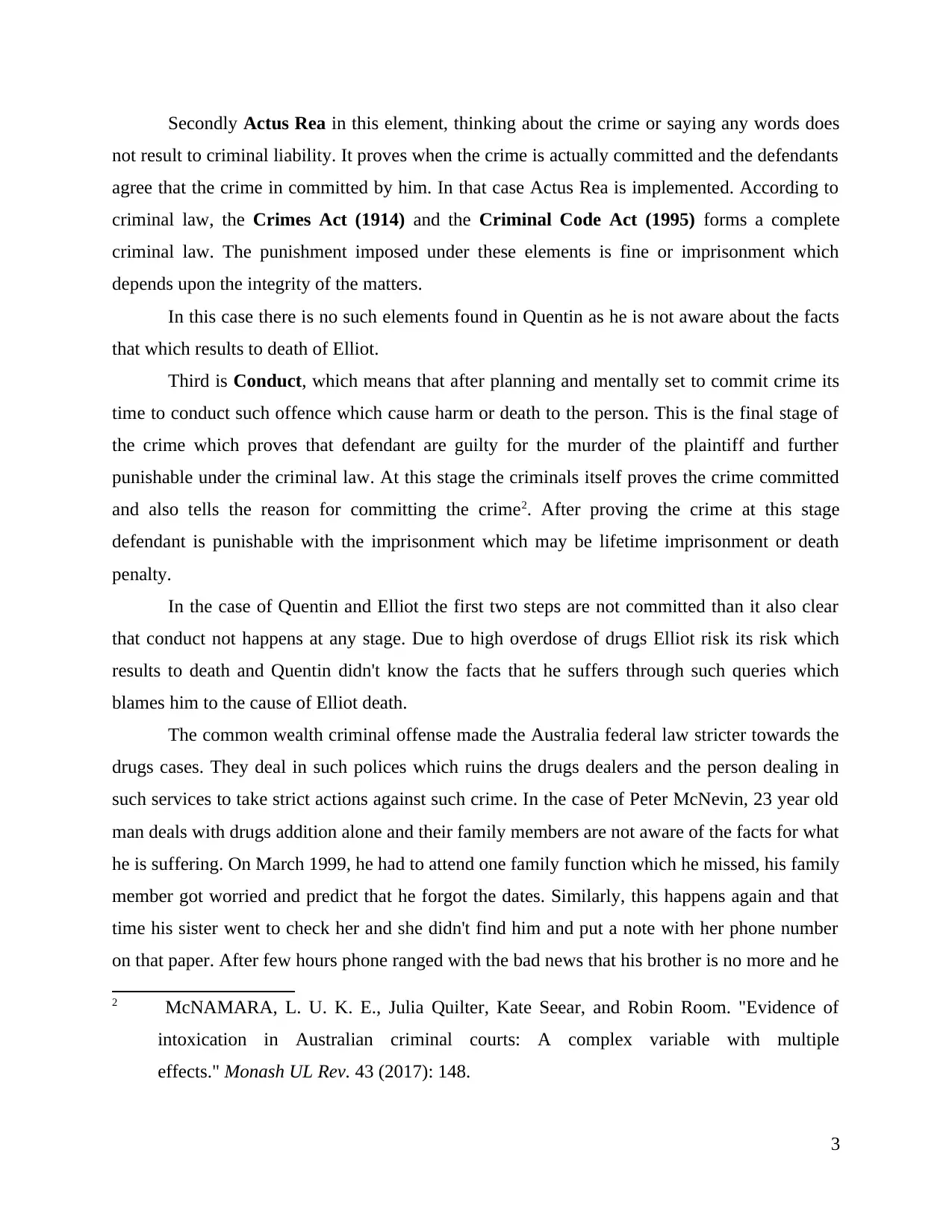
Secondly Actus Rea in this element, thinking about the crime or saying any words does
not result to criminal liability. It proves when the crime is actually committed and the defendants
agree that the crime in committed by him. In that case Actus Rea is implemented. According to
criminal law, the Crimes Act (1914) and the Criminal Code Act (1995) forms a complete
criminal law. The punishment imposed under these elements is fine or imprisonment which
depends upon the integrity of the matters.
In this case there is no such elements found in Quentin as he is not aware about the facts
that which results to death of Elliot.
Third is Conduct, which means that after planning and mentally set to commit crime its
time to conduct such offence which cause harm or death to the person. This is the final stage of
the crime which proves that defendant are guilty for the murder of the plaintiff and further
punishable under the criminal law. At this stage the criminals itself proves the crime committed
and also tells the reason for committing the crime2. After proving the crime at this stage
defendant is punishable with the imprisonment which may be lifetime imprisonment or death
penalty.
In the case of Quentin and Elliot the first two steps are not committed than it also clear
that conduct not happens at any stage. Due to high overdose of drugs Elliot risk its risk which
results to death and Quentin didn't know the facts that he suffers through such queries which
blames him to the cause of Elliot death.
The common wealth criminal offense made the Australia federal law stricter towards the
drugs cases. They deal in such polices which ruins the drugs dealers and the person dealing in
such services to take strict actions against such crime. In the case of Peter McNevin, 23 year old
man deals with drugs addition alone and their family members are not aware of the facts for what
he is suffering. On March 1999, he had to attend one family function which he missed, his family
member got worried and predict that he forgot the dates. Similarly, this happens again and that
time his sister went to check her and she didn't find him and put a note with her phone number
on that paper. After few hours phone ranged with the bad news that his brother is no more and he
2 McNAMARA, L. U. K. E., Julia Quilter, Kate Seear, and Robin Room. "Evidence of
intoxication in Australian criminal courts: A complex variable with multiple
effects." Monash UL Rev. 43 (2017): 148.
3
not result to criminal liability. It proves when the crime is actually committed and the defendants
agree that the crime in committed by him. In that case Actus Rea is implemented. According to
criminal law, the Crimes Act (1914) and the Criminal Code Act (1995) forms a complete
criminal law. The punishment imposed under these elements is fine or imprisonment which
depends upon the integrity of the matters.
In this case there is no such elements found in Quentin as he is not aware about the facts
that which results to death of Elliot.
Third is Conduct, which means that after planning and mentally set to commit crime its
time to conduct such offence which cause harm or death to the person. This is the final stage of
the crime which proves that defendant are guilty for the murder of the plaintiff and further
punishable under the criminal law. At this stage the criminals itself proves the crime committed
and also tells the reason for committing the crime2. After proving the crime at this stage
defendant is punishable with the imprisonment which may be lifetime imprisonment or death
penalty.
In the case of Quentin and Elliot the first two steps are not committed than it also clear
that conduct not happens at any stage. Due to high overdose of drugs Elliot risk its risk which
results to death and Quentin didn't know the facts that he suffers through such queries which
blames him to the cause of Elliot death.
The common wealth criminal offense made the Australia federal law stricter towards the
drugs cases. They deal in such polices which ruins the drugs dealers and the person dealing in
such services to take strict actions against such crime. In the case of Peter McNevin, 23 year old
man deals with drugs addition alone and their family members are not aware of the facts for what
he is suffering. On March 1999, he had to attend one family function which he missed, his family
member got worried and predict that he forgot the dates. Similarly, this happens again and that
time his sister went to check her and she didn't find him and put a note with her phone number
on that paper. After few hours phone ranged with the bad news that his brother is no more and he
2 McNAMARA, L. U. K. E., Julia Quilter, Kate Seear, and Robin Room. "Evidence of
intoxication in Australian criminal courts: A complex variable with multiple
effects." Monash UL Rev. 43 (2017): 148.
3
Secure Best Marks with AI Grader
Need help grading? Try our AI Grader for instant feedback on your assignments.
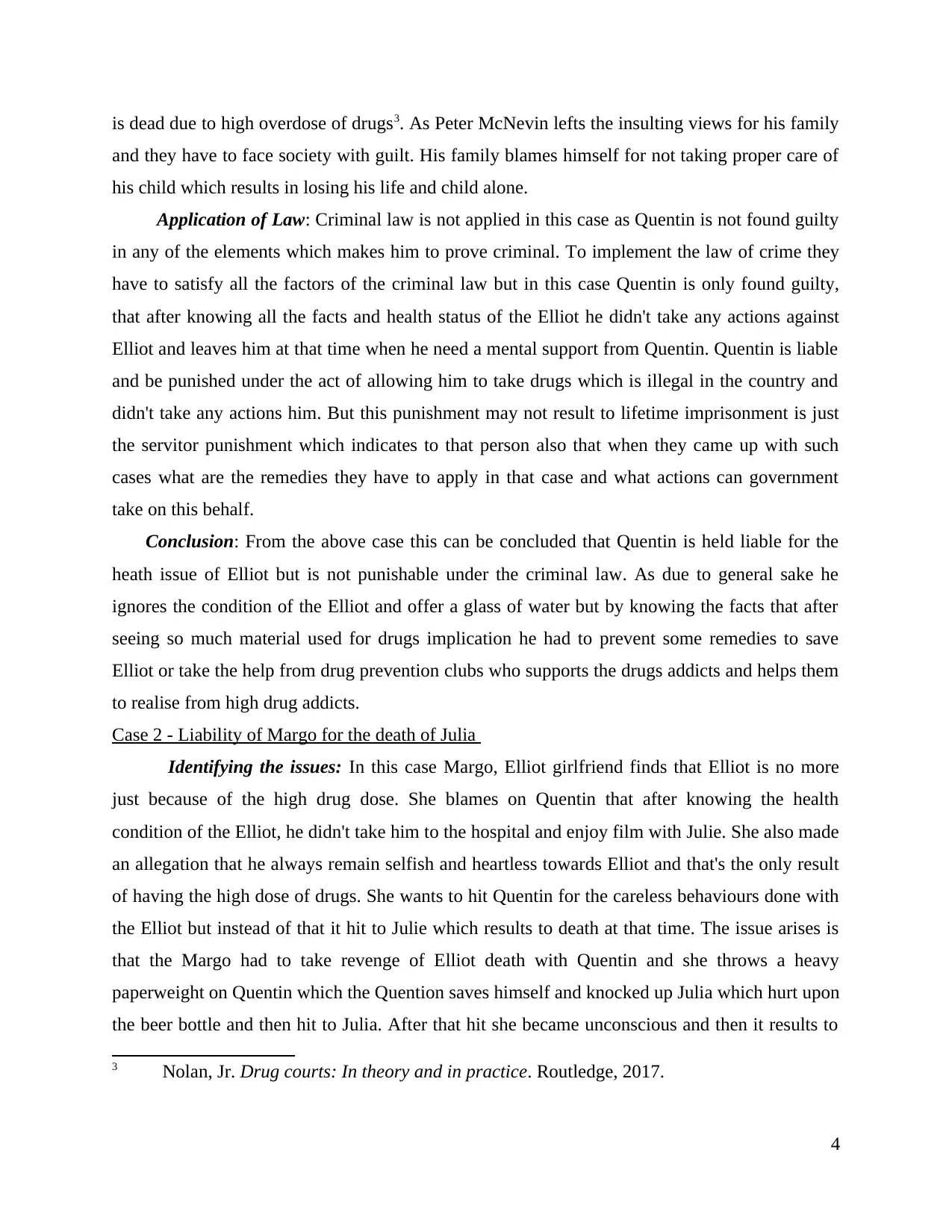
is dead due to high overdose of drugs3. As Peter McNevin lefts the insulting views for his family
and they have to face society with guilt. His family blames himself for not taking proper care of
his child which results in losing his life and child alone.
Application of Law: Criminal law is not applied in this case as Quentin is not found guilty
in any of the elements which makes him to prove criminal. To implement the law of crime they
have to satisfy all the factors of the criminal law but in this case Quentin is only found guilty,
that after knowing all the facts and health status of the Elliot he didn't take any actions against
Elliot and leaves him at that time when he need a mental support from Quentin. Quentin is liable
and be punished under the act of allowing him to take drugs which is illegal in the country and
didn't take any actions him. But this punishment may not result to lifetime imprisonment is just
the servitor punishment which indicates to that person also that when they came up with such
cases what are the remedies they have to apply in that case and what actions can government
take on this behalf.
Conclusion: From the above case this can be concluded that Quentin is held liable for the
heath issue of Elliot but is not punishable under the criminal law. As due to general sake he
ignores the condition of the Elliot and offer a glass of water but by knowing the facts that after
seeing so much material used for drugs implication he had to prevent some remedies to save
Elliot or take the help from drug prevention clubs who supports the drugs addicts and helps them
to realise from high drug addicts.
Case 2 - Liability of Margo for the death of Julia
Identifying the issues: In this case Margo, Elliot girlfriend finds that Elliot is no more
just because of the high drug dose. She blames on Quentin that after knowing the health
condition of the Elliot, he didn't take him to the hospital and enjoy film with Julie. She also made
an allegation that he always remain selfish and heartless towards Elliot and that's the only result
of having the high dose of drugs. She wants to hit Quentin for the careless behaviours done with
the Elliot but instead of that it hit to Julie which results to death at that time. The issue arises is
that the Margo had to take revenge of Elliot death with Quentin and she throws a heavy
paperweight on Quentin which the Quention saves himself and knocked up Julia which hurt upon
the beer bottle and then hit to Julia. After that hit she became unconscious and then it results to
3 Nolan, Jr. Drug courts: In theory and in practice. Routledge, 2017.
4
and they have to face society with guilt. His family blames himself for not taking proper care of
his child which results in losing his life and child alone.
Application of Law: Criminal law is not applied in this case as Quentin is not found guilty
in any of the elements which makes him to prove criminal. To implement the law of crime they
have to satisfy all the factors of the criminal law but in this case Quentin is only found guilty,
that after knowing all the facts and health status of the Elliot he didn't take any actions against
Elliot and leaves him at that time when he need a mental support from Quentin. Quentin is liable
and be punished under the act of allowing him to take drugs which is illegal in the country and
didn't take any actions him. But this punishment may not result to lifetime imprisonment is just
the servitor punishment which indicates to that person also that when they came up with such
cases what are the remedies they have to apply in that case and what actions can government
take on this behalf.
Conclusion: From the above case this can be concluded that Quentin is held liable for the
heath issue of Elliot but is not punishable under the criminal law. As due to general sake he
ignores the condition of the Elliot and offer a glass of water but by knowing the facts that after
seeing so much material used for drugs implication he had to prevent some remedies to save
Elliot or take the help from drug prevention clubs who supports the drugs addicts and helps them
to realise from high drug addicts.
Case 2 - Liability of Margo for the death of Julia
Identifying the issues: In this case Margo, Elliot girlfriend finds that Elliot is no more
just because of the high drug dose. She blames on Quentin that after knowing the health
condition of the Elliot, he didn't take him to the hospital and enjoy film with Julie. She also made
an allegation that he always remain selfish and heartless towards Elliot and that's the only result
of having the high dose of drugs. She wants to hit Quentin for the careless behaviours done with
the Elliot but instead of that it hit to Julie which results to death at that time. The issue arises is
that the Margo had to take revenge of Elliot death with Quentin and she throws a heavy
paperweight on Quentin which the Quention saves himself and knocked up Julia which hurt upon
the beer bottle and then hit to Julia. After that hit she became unconscious and then it results to
3 Nolan, Jr. Drug courts: In theory and in practice. Routledge, 2017.
4
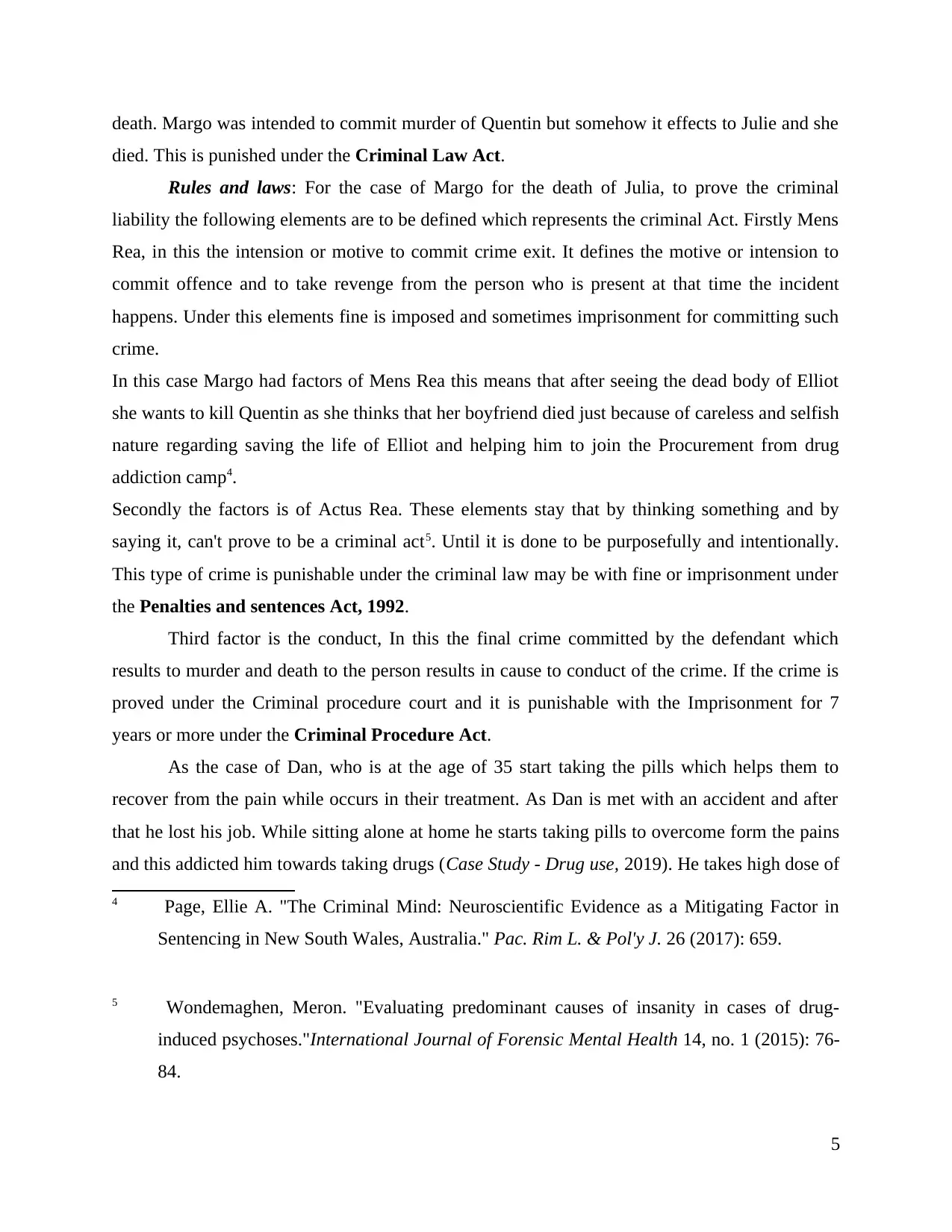
death. Margo was intended to commit murder of Quentin but somehow it effects to Julie and she
died. This is punished under the Criminal Law Act.
Rules and laws: For the case of Margo for the death of Julia, to prove the criminal
liability the following elements are to be defined which represents the criminal Act. Firstly Mens
Rea, in this the intension or motive to commit crime exit. It defines the motive or intension to
commit offence and to take revenge from the person who is present at that time the incident
happens. Under this elements fine is imposed and sometimes imprisonment for committing such
crime.
In this case Margo had factors of Mens Rea this means that after seeing the dead body of Elliot
she wants to kill Quentin as she thinks that her boyfriend died just because of careless and selfish
nature regarding saving the life of Elliot and helping him to join the Procurement from drug
addiction camp4.
Secondly the factors is of Actus Rea. These elements stay that by thinking something and by
saying it, can't prove to be a criminal act5. Until it is done to be purposefully and intentionally.
This type of crime is punishable under the criminal law may be with fine or imprisonment under
the Penalties and sentences Act, 1992.
Third factor is the conduct, In this the final crime committed by the defendant which
results to murder and death to the person results in cause to conduct of the crime. If the crime is
proved under the Criminal procedure court and it is punishable with the Imprisonment for 7
years or more under the Criminal Procedure Act.
As the case of Dan, who is at the age of 35 start taking the pills which helps them to
recover from the pain while occurs in their treatment. As Dan is met with an accident and after
that he lost his job. While sitting alone at home he starts taking pills to overcome form the pains
and this addicted him towards taking drugs (Case Study - Drug use, 2019). He takes high dose of
4 Page, Ellie A. "The Criminal Mind: Neuroscientific Evidence as a Mitigating Factor in
Sentencing in New South Wales, Australia." Pac. Rim L. & Pol'y J. 26 (2017): 659.
5 Wondemaghen, Meron. "Evaluating predominant causes of insanity in cases of drug-
induced psychoses."International Journal of Forensic Mental Health 14, no. 1 (2015): 76-
84.
5
died. This is punished under the Criminal Law Act.
Rules and laws: For the case of Margo for the death of Julia, to prove the criminal
liability the following elements are to be defined which represents the criminal Act. Firstly Mens
Rea, in this the intension or motive to commit crime exit. It defines the motive or intension to
commit offence and to take revenge from the person who is present at that time the incident
happens. Under this elements fine is imposed and sometimes imprisonment for committing such
crime.
In this case Margo had factors of Mens Rea this means that after seeing the dead body of Elliot
she wants to kill Quentin as she thinks that her boyfriend died just because of careless and selfish
nature regarding saving the life of Elliot and helping him to join the Procurement from drug
addiction camp4.
Secondly the factors is of Actus Rea. These elements stay that by thinking something and by
saying it, can't prove to be a criminal act5. Until it is done to be purposefully and intentionally.
This type of crime is punishable under the criminal law may be with fine or imprisonment under
the Penalties and sentences Act, 1992.
Third factor is the conduct, In this the final crime committed by the defendant which
results to murder and death to the person results in cause to conduct of the crime. If the crime is
proved under the Criminal procedure court and it is punishable with the Imprisonment for 7
years or more under the Criminal Procedure Act.
As the case of Dan, who is at the age of 35 start taking the pills which helps them to
recover from the pain while occurs in their treatment. As Dan is met with an accident and after
that he lost his job. While sitting alone at home he starts taking pills to overcome form the pains
and this addicted him towards taking drugs (Case Study - Drug use, 2019). He takes high dose of
4 Page, Ellie A. "The Criminal Mind: Neuroscientific Evidence as a Mitigating Factor in
Sentencing in New South Wales, Australia." Pac. Rim L. & Pol'y J. 26 (2017): 659.
5 Wondemaghen, Meron. "Evaluating predominant causes of insanity in cases of drug-
induced psychoses."International Journal of Forensic Mental Health 14, no. 1 (2015): 76-
84.
5
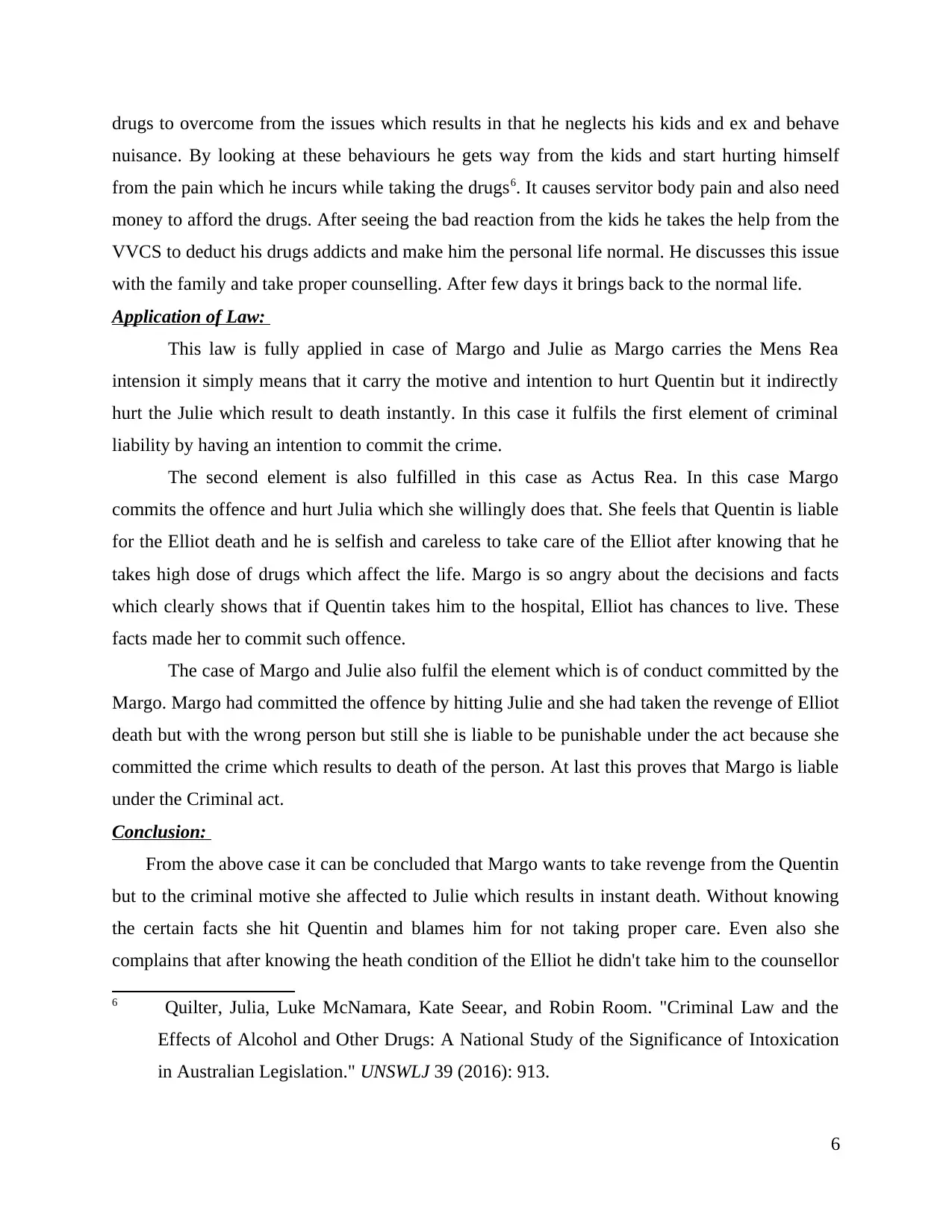
drugs to overcome from the issues which results in that he neglects his kids and ex and behave
nuisance. By looking at these behaviours he gets way from the kids and start hurting himself
from the pain which he incurs while taking the drugs6. It causes servitor body pain and also need
money to afford the drugs. After seeing the bad reaction from the kids he takes the help from the
VVCS to deduct his drugs addicts and make him the personal life normal. He discusses this issue
with the family and take proper counselling. After few days it brings back to the normal life.
Application of Law:
This law is fully applied in case of Margo and Julie as Margo carries the Mens Rea
intension it simply means that it carry the motive and intention to hurt Quentin but it indirectly
hurt the Julie which result to death instantly. In this case it fulfils the first element of criminal
liability by having an intention to commit the crime.
The second element is also fulfilled in this case as Actus Rea. In this case Margo
commits the offence and hurt Julia which she willingly does that. She feels that Quentin is liable
for the Elliot death and he is selfish and careless to take care of the Elliot after knowing that he
takes high dose of drugs which affect the life. Margo is so angry about the decisions and facts
which clearly shows that if Quentin takes him to the hospital, Elliot has chances to live. These
facts made her to commit such offence.
The case of Margo and Julie also fulfil the element which is of conduct committed by the
Margo. Margo had committed the offence by hitting Julie and she had taken the revenge of Elliot
death but with the wrong person but still she is liable to be punishable under the act because she
committed the crime which results to death of the person. At last this proves that Margo is liable
under the Criminal act.
Conclusion:
From the above case it can be concluded that Margo wants to take revenge from the Quentin
but to the criminal motive she affected to Julie which results in instant death. Without knowing
the certain facts she hit Quentin and blames him for not taking proper care. Even also she
complains that after knowing the heath condition of the Elliot he didn't take him to the counsellor
6 Quilter, Julia, Luke McNamara, Kate Seear, and Robin Room. "Criminal Law and the
Effects of Alcohol and Other Drugs: A National Study of the Significance of Intoxication
in Australian Legislation." UNSWLJ 39 (2016): 913.
6
nuisance. By looking at these behaviours he gets way from the kids and start hurting himself
from the pain which he incurs while taking the drugs6. It causes servitor body pain and also need
money to afford the drugs. After seeing the bad reaction from the kids he takes the help from the
VVCS to deduct his drugs addicts and make him the personal life normal. He discusses this issue
with the family and take proper counselling. After few days it brings back to the normal life.
Application of Law:
This law is fully applied in case of Margo and Julie as Margo carries the Mens Rea
intension it simply means that it carry the motive and intention to hurt Quentin but it indirectly
hurt the Julie which result to death instantly. In this case it fulfils the first element of criminal
liability by having an intention to commit the crime.
The second element is also fulfilled in this case as Actus Rea. In this case Margo
commits the offence and hurt Julia which she willingly does that. She feels that Quentin is liable
for the Elliot death and he is selfish and careless to take care of the Elliot after knowing that he
takes high dose of drugs which affect the life. Margo is so angry about the decisions and facts
which clearly shows that if Quentin takes him to the hospital, Elliot has chances to live. These
facts made her to commit such offence.
The case of Margo and Julie also fulfil the element which is of conduct committed by the
Margo. Margo had committed the offence by hitting Julie and she had taken the revenge of Elliot
death but with the wrong person but still she is liable to be punishable under the act because she
committed the crime which results to death of the person. At last this proves that Margo is liable
under the Criminal act.
Conclusion:
From the above case it can be concluded that Margo wants to take revenge from the Quentin
but to the criminal motive she affected to Julie which results in instant death. Without knowing
the certain facts she hit Quentin and blames him for not taking proper care. Even also she
complains that after knowing the heath condition of the Elliot he didn't take him to the counsellor
6 Quilter, Julia, Luke McNamara, Kate Seear, and Robin Room. "Criminal Law and the
Effects of Alcohol and Other Drugs: A National Study of the Significance of Intoxication
in Australian Legislation." UNSWLJ 39 (2016): 913.
6
Paraphrase This Document
Need a fresh take? Get an instant paraphrase of this document with our AI Paraphraser
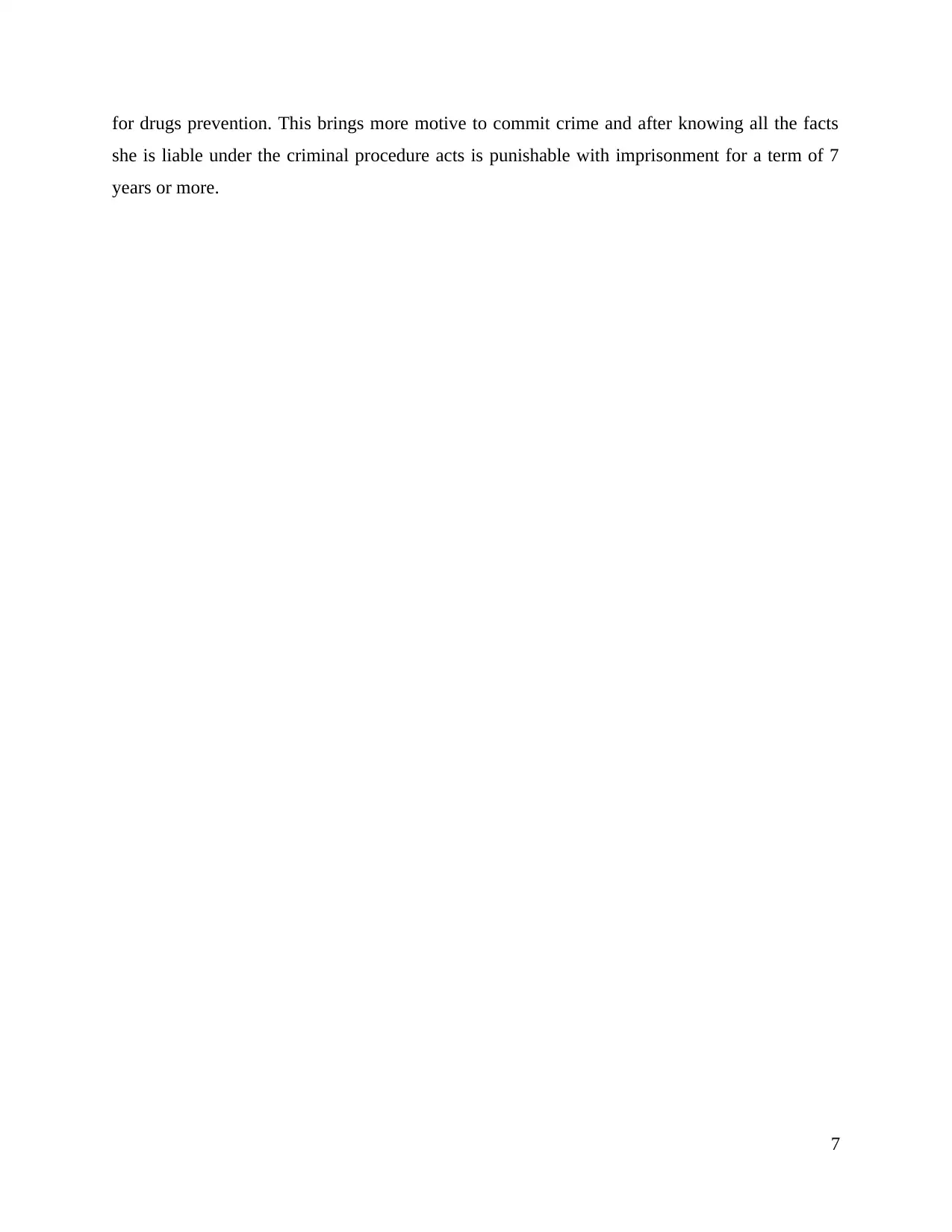
for drugs prevention. This brings more motive to commit crime and after knowing all the facts
she is liable under the criminal procedure acts is punishable with imprisonment for a term of 7
years or more.
7
she is liable under the criminal procedure acts is punishable with imprisonment for a term of 7
years or more.
7
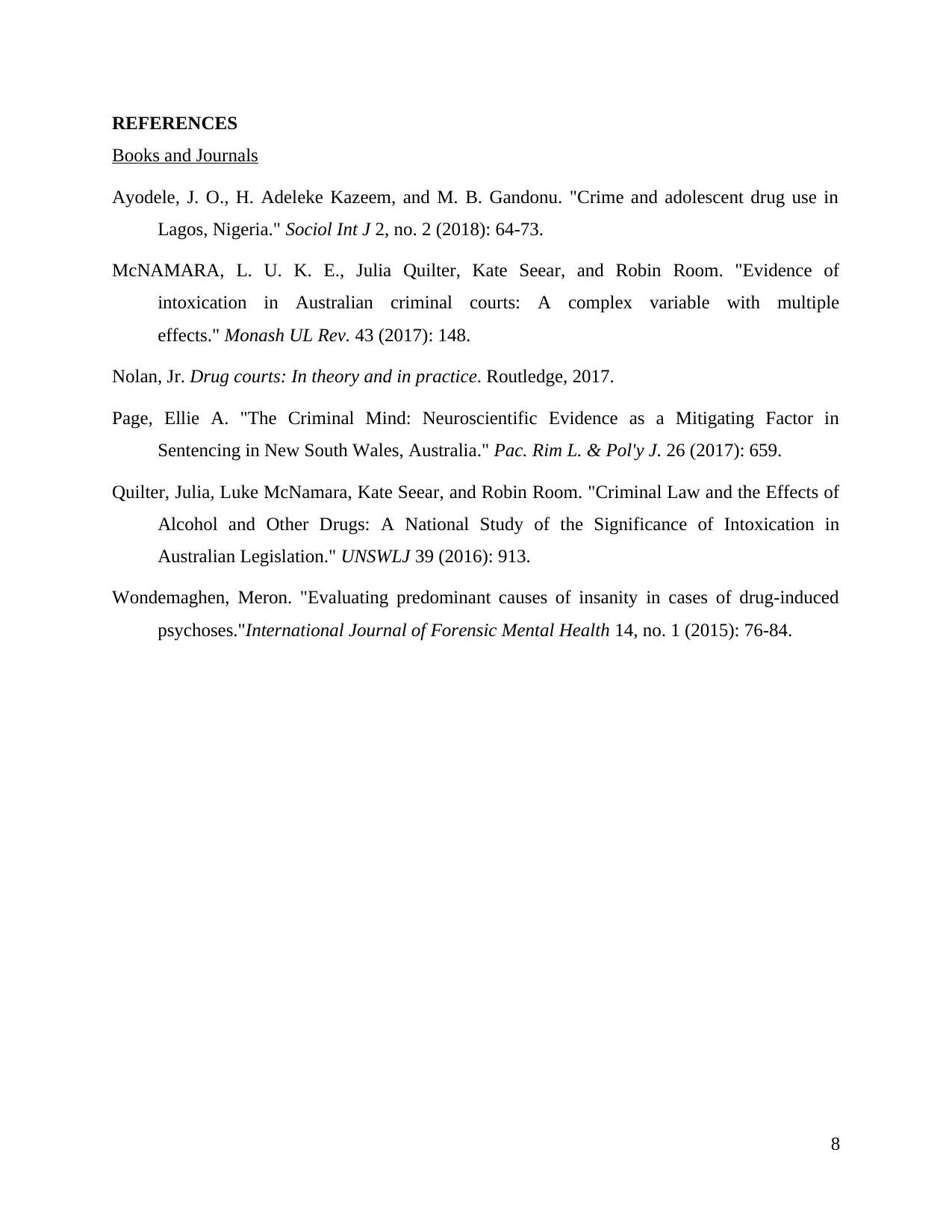
REFERENCES
Books and Journals
Ayodele, J. O., H. Adeleke Kazeem, and M. B. Gandonu. "Crime and adolescent drug use in
Lagos, Nigeria." Sociol Int J 2, no. 2 (2018): 64-73.
McNAMARA, L. U. K. E., Julia Quilter, Kate Seear, and Robin Room. "Evidence of
intoxication in Australian criminal courts: A complex variable with multiple
effects." Monash UL Rev. 43 (2017): 148.
Nolan, Jr. Drug courts: In theory and in practice. Routledge, 2017.
Page, Ellie A. "The Criminal Mind: Neuroscientific Evidence as a Mitigating Factor in
Sentencing in New South Wales, Australia." Pac. Rim L. & Pol'y J. 26 (2017): 659.
Quilter, Julia, Luke McNamara, Kate Seear, and Robin Room. "Criminal Law and the Effects of
Alcohol and Other Drugs: A National Study of the Significance of Intoxication in
Australian Legislation." UNSWLJ 39 (2016): 913.
Wondemaghen, Meron. "Evaluating predominant causes of insanity in cases of drug-induced
psychoses."International Journal of Forensic Mental Health 14, no. 1 (2015): 76-84.
8
Books and Journals
Ayodele, J. O., H. Adeleke Kazeem, and M. B. Gandonu. "Crime and adolescent drug use in
Lagos, Nigeria." Sociol Int J 2, no. 2 (2018): 64-73.
McNAMARA, L. U. K. E., Julia Quilter, Kate Seear, and Robin Room. "Evidence of
intoxication in Australian criminal courts: A complex variable with multiple
effects." Monash UL Rev. 43 (2017): 148.
Nolan, Jr. Drug courts: In theory and in practice. Routledge, 2017.
Page, Ellie A. "The Criminal Mind: Neuroscientific Evidence as a Mitigating Factor in
Sentencing in New South Wales, Australia." Pac. Rim L. & Pol'y J. 26 (2017): 659.
Quilter, Julia, Luke McNamara, Kate Seear, and Robin Room. "Criminal Law and the Effects of
Alcohol and Other Drugs: A National Study of the Significance of Intoxication in
Australian Legislation." UNSWLJ 39 (2016): 913.
Wondemaghen, Meron. "Evaluating predominant causes of insanity in cases of drug-induced
psychoses."International Journal of Forensic Mental Health 14, no. 1 (2015): 76-84.
8
1 out of 9
Related Documents
Your All-in-One AI-Powered Toolkit for Academic Success.
+13062052269
info@desklib.com
Available 24*7 on WhatsApp / Email
![[object Object]](/_next/static/media/star-bottom.7253800d.svg)
Unlock your academic potential
© 2024 | Zucol Services PVT LTD | All rights reserved.





